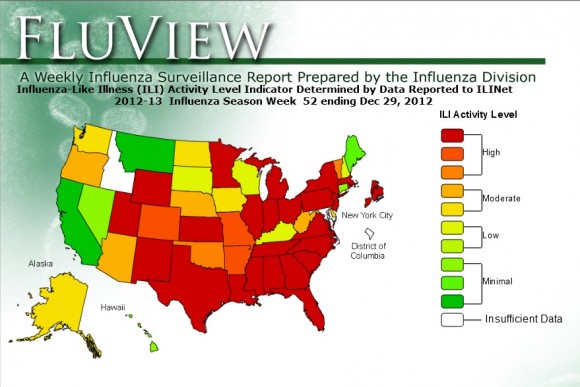Outbreak of flu symptoms prompts national concern

The flu outbreak is mapped above by color. (Photo from PBS)
By Carter Ashforth, Staff writer
As we return to our Gettysburg College campus for spring 2013, the last thing we all want upon our return is the flu. The flu has surely been discussed around dinner tables at home and now amongst circles of friends either in Servo, Musselman Library or the dorms. It is comparable to an evil demon threatening to spoil the first few weeks back from a long winter break. Students should certainly be wary of this virus. It has killed about 29 Americans this year, according to the New York Times Health section and is estimated to kill even more. It has officially been deemed an “epidemic” by many, including CBS. “The Center for Disease Control and Prevention has said that this year’s flu season [will] be one of the worst the country has seen in ten years,” according to The Huffington Post.
The start of a new semester should bring about new textbooks and school supplies, perhaps a new meal plan, but most importantly, a keen awareness for symptoms of the dreaded flu. The Gettysburg College Health Service explains how important it is to recognize the obvious initial symptoms of the flu. These include fever, cough, sore throat, runny or stuffy nose, body aches, headache and possible vomiting and diarrhea. The Gettysburg College Heath Center is working hard to prevent an outbreak on our campus and is trying to advertise and persuade the community to follow the Center for Disease Control and Prevention’s national campaign known as, “Take 3 Actions To Fight The Flu.” These three steps include getting the flu vaccine, taking everyday preventive actions to stop the spread of germs, and taking a complete set of flu antiviral drugs if your healthcare provider prescribes them.
In addition to discussing the severity of this season’s flu outbreak, many of us have already or are currently partaking in the national and global debate over the actual effect of the flu vaccine. The Center for Disease Control and Prevention and the government has been strongly urging everyone to receive the vaccine. The country is experiencing an extreme pressure to receive the flu vaccine, but many people do not know whom to believe. There are studies that shed light on the questionable effectiveness of the vaccines. Natural News explained a study published in The Lancet that dismantled the claim that the flu vaccine is 60 percent effective. The study proves that in fact, “Flu vaccines only prevent the flu in 1.5 out of every 100 adults injected with the vaccine!” The article explains how statistics can be very misleading: 60 percent effective does not have the same meaning it has to the popular people that it does to scientists and statisticians. The study proves that the vaccine actually only helps 1.5 adults of 100. The study also discusses the side effects of the drug, which include neurological side effects like dementia.
This Lancet study, while unearthing some very controversial and possibly true statements, is not perfect. There are other studies that say similar things about the ineffectiveness and damage of the vaccine but yet, the U.S. Government and Center for Disease Control and Prevention remain extremely adamant about the importance and need for the vaccine. It is a personal decision and ultimately, it is possible to get the flu no matter what precautions are taken. Regardless if one chooses to get the vaccine or not, it is critical to take all necessary steps to stay healthy, such as having a well-rounded diet, take multivitamins daily and get enough sleep. Stay healthy and flu-free, Bullets!
